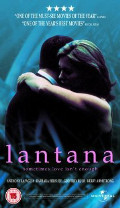
Directed by
Ray Lawrence
115 minutes
Rated M
Reviewed by
Bernard Hemingway

Lantana
Synopsis: Psychiatrist Dr Valerie Somers (Barbara Hershey) has written a book about the murder of her 11 year-old daughter Eleanor. Valerie's clients include Sonja (Kerry Armstrong) who suspects her husband Leon (Anthony La Paglia), a homicide detective, of being unfaithful. Another client, Patrick Phelan, (Peter Phelps) has revealed details of an affair with a married man - Valerie suspects it is her own husband (Geoffrey Rush). The emotional maelstrom intensifies when Valerie goes missing.Lantana is about middle-aged, middle-class people with stale marriages stalling in their comfortable ruts and trying feebly to get out of them. If you are contemplating the joys of wedlock this film is not likely to be encouraging. That it has been enormously successful on the Australian domestic market is somewhat surprising as it is hardly megaplex fare, but on the other hand, as with other Jan Chapman productions, such as The Piano (1993) it is polished arthouse product, mixing "adult drama" content with well-crafted production values and spiced with a sprinkling of star-value, part-Australian, part American. In other words it allows the audience to feel that they have witnessed a serious film (disintegrating marriages, mid-life crises, gay love) but at the same time guarantees that it remains safely parenthesized as a film - that is, other to the viewer's daily existence (ergo, the film's neatly resolving epilogue) rather than being a challenge to it.
In part this derives from the fact that the script by Andrew Bovell is from his own stage play, theatre, of necessity, having that otherness to day-to-day life. This artificial quality, notably the Mamet-like plot, jars with the pretence that we are seeing real people's lives (the messy interiors, unmade-up women etc). For me the plot development was too organised, the characters too-clearly mirroring the standard social class divisions yet at the same time all sharing a self-ruminative quality and the dialogue sometimes lamely predictable (or is that like real life?). Fortunately just when this staring into the inner void is all starting to become too protracted a whodunnit aspect is introduced, reinvigorating our interest and sustaining us to the inventive denouement (though we still have to endure the glib epilogue).
I was surprised that it was both written and directed by males, for, as much as it is about men's emotional defensiveness, for me, it was even more about women's emotional needs. In this latter respect perhaps we should conclude that it depicts men's perceptions of women's needs. Performances I found mixed but in general limited by the "respectability" already alluded to. Barbara Hershey, looking as washed out as an old mop seemed an odd choice and out of her depth (what would Jessica Lange have made of a part like that?) and Anthony LaPaglia's efforts at heavy emoting didn't light my fire.
Much of this sounds pretty damning but there is an element here of simply being harsher on our home-grown product. All up, this is a very well made film (director Ray Lawrence has a considerable CV in TV commercials) with stylish cinematography by Mandy Walker and a well-integrated soundtrack.
Want something different?





